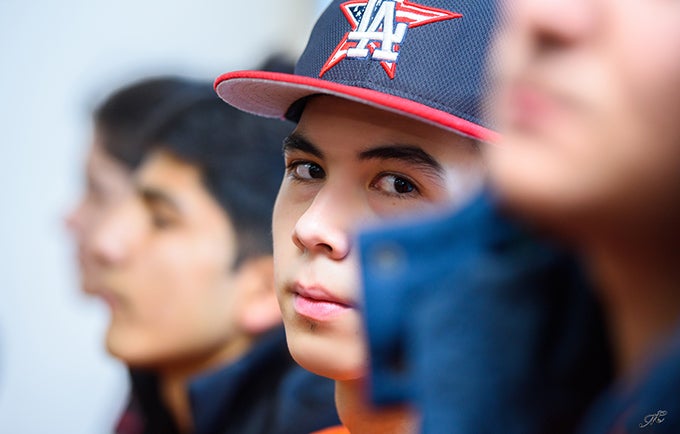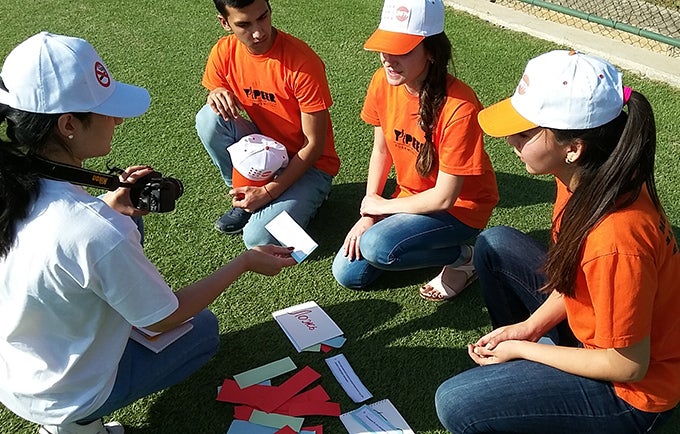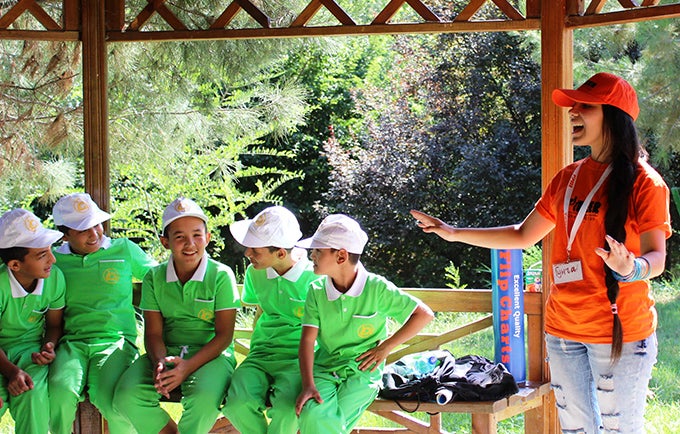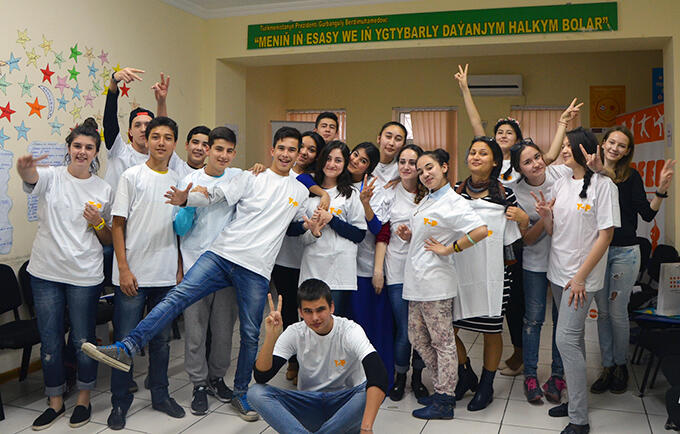ASHGABAT, Turkmenistan — Eziz, 15, was full of insecurities and concerns about his future when he called a local teen hotline last year. He had also started smoking due to peer pressure at school. Today, he is seen as a leader among his classmates and is helping other adolescents make healthier life choices.
This transformation has come about as a result of Eziz’s involvement with Y-PEER, a UNFPA-supported youth network that provides young people with life skills and accurate health information through a peer-to-peer approach.
“Y-PEER activities changed my life — they were convincing, inspirational and empowering,” says Eziz. “The sessions on the risks of bad habits and their effect on our health, as well as the interactive games teaching decision-making skills and the ability to say ‘No!’ really pushed me to believe in myself.”
Eziz quit smoking and has become a Y-PEER volunteer himself, actively sharing his experiences during sessions on healthy lifestyles and serving as a role model for his peers. His parents and teachers say he has become more independent, responsible and motivated to learn new things and discover new horizons.

Y-PEER volunteer Eziz discovered the group through a call to a local teen hotline. Photo: UNFPA Turkmenistan
“There is a sharp difference between the shy boy who first walked into our youth centre and the one who is now among our most active Y-PEER volunteers today,” says Maya Meretkuliyeva, a UNFPA youth outreach specialist and the coordinator of a new youth centre in Ashgabat that was opened with the support of UNPFA and the Ministry of Education of Turkmenistan. “It is such a pleasure to see how much Eziz has grown and matured as an individual and as a leader.”
Y-PEER changed my life — they were convincing, inspirational and empowering. —Eziz, age 15
Eziz’s initial call to the local teen hotline resulted in a referral to the newly established youth centre, the third such facility in Turkmenistan hosting Y-PEER’s peer-education activities. Focus groups conducted by UNFPA have shown that young people are more likely to discuss issues related to their reproductive health — questions about their developing bodies, emotions and relationships — with their peers rather than with their parents or other adults. By providing teens with accurate, complete information on reproductive health and fun, structured activities within which to share such information, Y-PEER helps adolescents teach each other about serious topics such as prevention of bad habits; sexually transmitted infections, including HIV; unintended pregnancies; and gender-based violence.
Y-PEER volunteers in Turkmenistan joined events for International Family Day 2016, which was celebrated with the theme “Good health and well-being starts in families.” Photo: UNFPA Turkmenistan
“Adolescence represents one of the critical transitions in the life span. Many serious diseases in adulthood, including those that cause premature death, have their roots in conditions or behaviour that begin during adolescence,” says UNFPA Assistant Representative Bayramgul Garabayeva. “Putting the correct information in young people’s hands is indispensable for helping them make healthy and responsible choices, in addition to having youth-friendly health services and evidence-based youth policies.”
More than 26,000 young people have had the opportunity to increase their knowledge about healthy and responsible lifestyles through peer-to-peer activities since the creation of the first youth centres in Turkmenistan.
“The data and feedback we have collected from young people, their parents and teachers show that there is a high demand for youth-friendly services and information on healthy living, including adolescent reproductive health, in Turkmenistan,” says youth centre coordinator Meretkuliyeva.
Y-PEER volunteers like Eziz take part in trainings for trainers, as well as leadership courses, to become equipped to lead healthy-lifestyle sessions and related activities at youth centres, secondary schools,
summer camps and public events. They also get opportunities to meet with members of the Turkmenistan Parliament and voice the concerns and ideas of the country’s youth.
A Y-PEER volunteer leads a session on healthy lifestyles at a summer camp in the Geok Dere mountains of Turkmenistan. Photo: UNFPA Turkmenistan
In addition to supporting Y-PEER and the growing network of youth centres in Turkmenistan, UNFPA and the Ministry of Education are also cooperating on increasing the access of young people to information on adolescent reproductive health and gender equality at schools. Mandatory courses on basic life skills have been introduced in the country’s secondary schools and the quality of teaching is being improved through the integration of international standards and norms.
“Turkmenistan is home to more than 2 million young people aged 10 to 29, who make up nearly 40 per cent of the country’s population,” says UNFPA’s Garabayeva. “We believe that when a country invests in the health, education and well-being of its youth and adolescents, and creates an enabling environment for them to realize their full potential, these investments can bring huge benefits for the economy and society as a whole in the future.”





